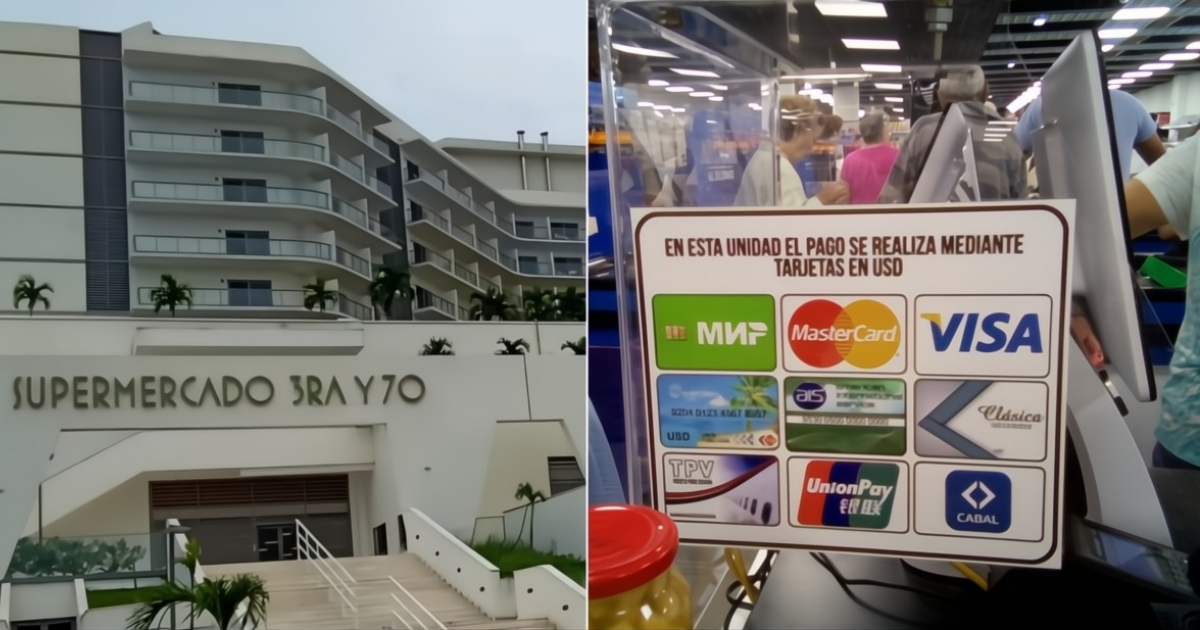
Related videos:
The recent opening of a supermarket in Havana that only accepts cash in dollars or cards linked to foreign currency accounts has sparked a wave of outrage among Cubans. Among the criticisms, it has been highlighted that the regime gives change in candy.
The establishment, located at 3rd and 70 in Playa municipality, is situated opposite the old market that operates in Freely Convertible Currency (MLC) and is nearly empty. The new supermarket is stocked with products, but the few payment options restrict access for most of the population.
Payment in dollars and change in candies
One of the most controversial aspects of this market is that when you pay in cash, the change is given to you in bills, but if it's less than a dollar, you're required to take candies or snacks instead, as coins of this denomination do not circulate in Cuba.
The practice of giving change with candies has reminded Cubans of times when the regime implemented forms of exchange that many consider institutionalized theft.
Since the 1960s, when the original Cuban peso was replaced, to the recent exchange of the CUC for the MLC, thousands of people have lost their savings in each monetary transformation implemented by the government.
Memories of an Abusive Exchange System
In past decades, similar cases have occurred. Cuba had tourism currencies with denominations similar to the dollar, forced exchanges of dollars to CUC, and the conversion of foreign currency accounts to CUC, and then these to Cuban pesos.
Another memorable practice was the "Casa del Oro" in the 1990s, where Cubans would hand over their jewelry in exchange for the sadly remembered "chavitos," which could only be used in small state-run shops.
Similarly, the currency certificates used in the 1980s and the forced exchanges of dollars for other currencies have been examples of how the government has managed the economy in a manner that many describe as authoritarian and arbitrary.
Each of these episodes left thousands of Cubans economically affected, generated discontent among the population, and led to a profound loss of trust in the management of the Central Bank of Cuba and the government.
An exclusive supermarket in the midst of the crisis
The supermarket at 3rd and 70 offers a wide variety of products, ranging from food and personal care items to appliances. The establishment is part of the Gran Muthu Habana Hotel, managed by the MGM Muthu Hotels chain and the Gaviota group, under the control of the military leadership, GAESA.
This type of exclusive market reflects the dollarization of the Cuban economy, which prioritizes the influx of foreign currency while the majority of the population is left with a devalued Cuban peso.
The new supermarket at 3rd and 70 represents an unattainable luxury for most and a further indication of the inequalities that characterize daily life in Cuba. Meanwhile, the change in candy is nothing more than a reminder of the disregard for the real needs of the population.
Frequently Asked Questions about the New Dollar Supermarket in Havana
Why does the new supermarket in Havana only accept dollars?
The new supermarket in Havana only accepts dollars as part of a strategy by the Cuban regime to attract foreign currency amid the economic crisis. These types of establishments reflect the partial dollarization of the Cuban economy, prioritizing the collection of dollars while the majority of the population is excluded due to the devalued peso.
How do they give change at the new supermarket in Havana?
In the new supermarket in Havana, change is not given in dollars due to the lack of coins in this denomination in Cuba. Instead, employees hand out candies or cookies to make up the total amount of purchases, a practice that has been criticized and seen as a reminder of the abusive economic changes of the past in the country.
Why has the opening of the dollar supermarket caused outrage?
The opening of the dollar supermarket has sparked outrage as it highlights the economic exclusion faced by the majority of Cubans. With prices that are beyond reach and the inability to pay with the national currency or freely convertible currency (MLC), it underscores the social and economic inequality on the island, increasing the discontent among the population who do not have access to dollars.
How does partial dollarization affect the average Cuban?
Partial dollarization in Cuba affects the average Cuban by increasing inequality. While the government prioritizes capturing foreign currency through markets and stores that only accept dollars, those without access to this currency are left relying on an increasingly devalued Cuban peso. This not only limits access to basic goods but also perpetuates poverty and dependence on remittances sent from abroad.
Filed under: